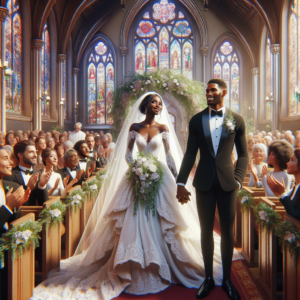Unveiling Cultural Marriage Practices: Traditions That Shock and Inspire
Marriage is a universal institution, yet the customs and traditions surrounding it vary dramatically across cultures. From elaborate ceremonies to simple exchanges of vows, the diversity of marriage practices reflects the rich tapestry of human experience. This article delves into the multifaceted world of cultural marriage practices, exploring their historical contexts, unique rituals, and the profound impact of religion and spirituality. We will also share inspiring stories that highlight love and commitment across different cultures, while considering how these traditions are evolving in our increasingly globalized society.
Exploring the Diversity of Cultural Marriage Practices Around the World
Cultural marriage practices are as varied as the societies that celebrate them. In India, for instance, weddings can last several days and involve intricate rituals such as the Mehndi ceremony, where henna is applied to the bride's hands and feet. In contrast, a traditional Japanese Shinto wedding may feature a simple ceremony at a shrine, emphasizing purity and harmony. In some African cultures, bride price is a significant aspect of marriage, symbolizing respect and the union of two families. These examples illustrate how marriage practices are deeply rooted in cultural identity, reflecting values, beliefs, and social structures unique to each community. As globalization continues to influence cultural exchanges, many societies are witnessing a blend of traditional and modern practices, leading to new interpretations of marriage.
Historical Context: How Traditions Shape Modern Marriage Ceremonies
The historical context of marriage practices provides insight into their evolution and significance. In many cultures, marriage has historically served as a means of forming alliances between families or tribes, often dictated by economic or political considerations. For example, in medieval Europe, marriages were frequently arranged to consolidate power or wealth. Over time, the romantic notion of marriage emerged, particularly during the Renaissance, when love became a more prominent factor in choosing a partner. Today, while many couples still honor traditional customs, there is a growing trend toward personalizing ceremonies to reflect individual values and beliefs. This shift illustrates how historical practices continue to shape modern marriage ceremonies, blending tradition with contemporary ideals of love and partnership.
Unique Rituals: Marriage Customs That Challenge Conventional Norms
Some cultural marriage practices challenge conventional norms and provoke thought about the nature of commitment and partnership. In certain Indigenous cultures in North America, for example, marriage may not be a permanent contract but rather a spiritual partnership that can evolve or dissolve over time. In the Philippines, the "pamanhikan" ceremony involves the families of both the bride and groom coming together to discuss the marriage, emphasizing communal involvement in the union. Meanwhile, in parts of China, the tradition of "ghost marriage" allows for a deceased person to be married to ensure their spirit is honored and not left alone in the afterlife. These unique rituals not only challenge societal norms but also invite deeper reflections on the meaning of love, commitment, and the roles of family and community in marriage.
The Role of Religion and Spirituality in Cultural Marriage Practices
Religion and spirituality play a pivotal role in shaping cultural marriage practices around the globe. In many societies, marriage is viewed as a sacred union ordained by a higher power, which adds layers of significance to the ceremony. For instance, in Christian traditions, the sacrament of marriage is celebrated with vows exchanged in the presence of God, symbolizing a lifelong commitment. In Hinduism, the "saptapadi" ritual involves the couple taking seven steps together, each representing a vow that binds them spiritually and physically. Similarly, Islamic weddings often include the "nikah," a formal contract that outlines the rights and responsibilities of both partners. These religious rituals not only provide a framework for marriage but also reinforce the spiritual dimensions of love and partnership, emphasizing the importance of faith in sustaining relationships.
Inspiring Stories: Love and Commitment Across Different Cultures
Across cultures, stories of love and commitment abound, showcasing the resilience of the human spirit in the face of challenges. One such story is that of a couple from different religious backgrounds who navigated the complexities of their respective traditions to create a unique wedding ceremony that honored both faiths. Their journey exemplifies how love can transcend cultural barriers and inspire others to embrace diversity. Another inspiring tale comes from a community in Brazil, where couples participate in a "wedding parade" to celebrate their unions publicly, fostering a sense of belonging and community support. These narratives not only highlight the beauty of love but also serve as reminders of the shared values that unite us, regardless of cultural differences.
The Future of Marriage: Evolving Traditions in a Globalized Society
As societies become increasingly interconnected, the future of marriage is likely to reflect a blend of traditional and modern practices. Globalization has facilitated the exchange of ideas and customs, leading to the emergence of hybrid marriage ceremonies that incorporate elements from various cultures. For instance, couples may choose to include traditional rituals from their respective heritages while also embracing contemporary themes such as gender equality and personal autonomy. Additionally, the rise of technology and social media is reshaping how couples plan and celebrate their weddings, making it easier to share their unique stories with a global audience. As we move forward, the evolution of marriage traditions will continue to be influenced by cultural exchange, individual choice, and the ongoing quest for meaningful connections.
In conclusion, the exploration of cultural marriage practices reveals a rich diversity that reflects the complexities of human relationships. From historical contexts to unique rituals, the influence of religion, and inspiring stories of love, it is clear that marriage is not merely a legal contract but a profound expression of commitment and community. As traditions evolve in our globalized society, the essence of marriage remains rooted in the universal desire for connection, love, and partnership. Embracing this diversity not only enriches our understanding of marriage but also fosters a greater appreciation for the myriad ways in which people celebrate love across the world.
